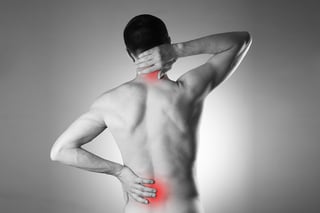
Do you know all your options for chronic pain management? Take this quiz to find out!
1.) Although developed for the treatment of depression, which class of antidepressant medications is more effective in the management of chronic pain, with evidence that they have an analgesic effect?
A. Selective serotonin reuptake inhibitors (SSRIs) are more effective
B. Tricyclic antidepressants (TCAs) are more effective
C. The analgesic effect of SSRIs and TCAs are equal
2.) Which painful conditions, including but not limited to the following, respond to treatment with TCAs, particularly nortriptyline and desipramine?
A. Migraine headache
B. Diabetic neuropathy
C. Postherpetic neuralgia
D. A and B
E. All of the above
B. Diabetic neuropathy
C. Postherpetic neuralgia
D. A and B
E. All of the above
3.) There are ______________ side effects associated with the use of TCAs for the treatment of painful conditions.
A. Significant
B. Few
C. No
B. Few
C. No
4.) Chronic pain in the neck, back, teeth and pelvic area can be treated safely with prolozone therapies?
A. True
B. False
B. False
5.) Which medications can be used as first-line treatment in patients with neuropathic pain?
6.) True or False. When anticonvulsant medications are used for the management of chronic pain, they are administered at relatively high doses and the use of sedation is common.
A. True
B. False
B. False
7.) This medication reduced chronic migraines in patients from about 10 per month to 4 per month.
A. Oxycodone
B. Marijuana
C. Tylenol
B. Marijuana
C. Tylenol
You might be able to break the cycle of harmful and addictive pain medications.
Using medical marijuana to control chronic pain reported a 64% decrease in use of opioids for pain relief. The patients also reported a 45% increase in their quality of life. The use of medical marijuana could be the new alternative for harsh opioids for pain management. Thankfully, New York has legalized the use of medicinal marijuana. Call Dr. E. at 845 680-6600 to schedule your medical marijuana consult.
Prolozone therapy goes right to the root cause of the pain and delivers immediate relief. Prolozone therapy is an injectable therapy that is used to treat chronic pain anywhere in the body. It is a combination of natural steroids, tissue regeneration homeopathics, cellular nutrients, proliferants and ozone. This combination repolarizes cellular membranes so injured cells can heal. Inflammation and swelling disappear. Proliferants stimulate growth factor production and ozone stimulates healthy blood flow.
Answer Key:
1. B. Tricyclic antidepressants (TCAs) are more effective- According to the 19th edition of Harrison’s Principles of Internal Medicine, there is evidence that TCAs have an analgesic effect, whereas SSRIs are less effective for relieving pain compared to TCAs in the management of pain.
2. E. All of the above- Painful conditions including migraine headache, diabetic neuropathy, and postherpetic neuralgia respond to treatment with TCAs. Other conditions that also respond to TCAs include: tension headache, rheumatoid arthritis, chronic low back pain, cancer, and central post stroke pain.
3. A. Significant- There are significant side effects associated with the use of TCAs for the treatment of painful conditions, including orthostatic hypotension, drowsiness, cardiac conduction, delay, memory impairment, constipation, and urinary retention. These are particularly problematic in elderly patients, and several are additive to the side effects of opioid analgesics
4.) A. True -Prolozone is safe, and effective because it delivers critical vitamins, minerals, hydration, homeopathics and ozone into the affected areas.
5. D. A and C - Anticonvulsants, such as gabapentin or pregabalin, and antidepressant medications, such nortriptyline, desipramine, duloxetine, or venlafaxine, can be used as first-line treatment in patients with neuropathic pain. Less effective are systemically administered antiarrhythmic medications such as lidocaine and mexiletine.
6. ) A. True - When anticonvulsant medications are used for the management of chronic pain, they are administered at relatively high doses and the use of sedation is common.
7. ) B. Marijuana - Researchers found that the monthly occurrence of migraine headaches significantly decreased with medical marijuana use.



